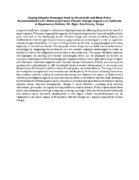| dc.contributor.author | Sindani, Bon | |
| dc.date.accessioned | 2019-04-03T06:46:40Z | |
| dc.date.available | 2019-04-03T06:46:40Z | |
| dc.date.issued | 2018-06-12 | |
| dc.identifier.issn | ISBN: ISBN: 978-9966-59-011-5 | |
| dc.identifier.uri | http://erepository.kibu.ac.ke/handle/123456789/589 | |
| dc.description.abstract | Long term and short changes in climate are disproportionately affecting all parts of the world in equal measure. The most impacted by vagaries of climate change are the most vulnerable and the poor who live in the developing world. Climate change and climate variability impacts the smallholder farmers though they continue to apply traditional technologies in order to cope with climate change vulnerability. In most of the parts the world over, coping strategies are lacking especially in the African States. The purpose of this study was to build new transformation knowledge by integrating the traditional and the modern adaptive technologies in order to transform lives of the indigenous communities in the study area. This paper therefore explores and highlights the existing and modern technologies which can be employed by farmers to counteract the impacts of climate change and climate variability. Data collected through in-depth and informant interviews together with Focused Group Discussions (FGDs) and a structured questionnaire administered to 384 household heads in twelve sub-locations in the study area (Kapsokwony Division) formed the basis of these policy recommendations. The long and short term adaptive strategies and recommendations developed by all the actors including those from the academia and the traditional communities during the research are meant to build climate resilience and adaptive capacity at local and national levels. A framework that has been developed by this research will help support policy decisions in conservation agriculture and livestock rearing systems, water resource management, change in social behavior, accessing early warning information, promotion of organic farming and human health systems. If fully implemented these policy recommendations will go a long way to bring a paradigm shift that will improve livelihoods and enhance social economic development in the region. These recommendations can be replicated in any other region to bring about desired changes to a people impacted by climate change. | en_US |
| dc.language.iso | en | en_US |
| dc.publisher | KIBU | en_US |
| dc.rights | Attribution-NonCommercial-ShareAlike 3.0 United States | * |
| dc.rights.uri | http://creativecommons.org/licenses/by-nc-sa/3.0/us/ | * |
| dc.title | Coping adaptive strategies used by households and make policy recommendations for addressing future climate change impacts on livelihoods in Kapsokwony Division, Mt. Elgon Sub-County, Kenya | en_US |
| dc.type | Other | en_US |

